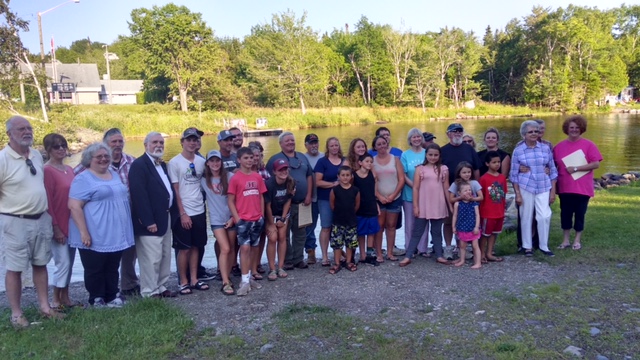
ORIENT, Maine — On Monday, July 17, about three dozen residents of Orient gathered at the foot of the bridge crossing the north end of East Grand Lake to recognize one of the town’s more significant historical events.
First Selectman Henry Hartley read a proclamation stating that July 17 would now be known as Col. John Allen Day.
Allen was an officer with the Massachusetts militia of the Continental Army during the Revolutionary War, serving under George Washington as superintendent of the Eastern Indians and as an infantry colonel.

Henry Hartley, right, chairman of the Orient Board of Selectmen is thanked by local historian Richard L. Rhoda for issuing a proclamation by the town July 17 recognizing the 240th anniversary of Col. John Allen leading Maliseets down Grand Lake. (Contribued photo)
In July 1777, the colonel led about 480 Maliseet Indians in 128 canoes from their village in Nova Scotia (now New Brunswick) to Machias. A skilled negotiator who spoke their language, he had recruited the Indians to stand with the Americans during the war. In his journal, Allen said they went “over a pond [now named North Lake], and then a narrow pass about 2 miles, then entered the large lake [now East Grand]. Went about 7 leagues to outlet into Scoodic river.”
The idea of the proclamation was presented to the Orient selectmen by Houlton attorney Richard Rhoda who owns a camp on Grand Lake and has a deep interest in history, particularly local history. Rhoda was one of the people instrumental in getting the monument of George Washington erected at the western end of Market Square in Houlton a number of years ago.
Born in 1746 to a Scottish gentleman who served as an officer in the British army, Allen moved to Halifax with his family when he was 3 years old. Sent to Massachusetts to be educated, he learned French and several Indian dialects. As a young man, he held various public service positions, including a seat in the Nova Scotia House of Assembly. In the summer of 1776, accused of treason because of his patriotic sentiments regarding the budding revolution, he fled Halifax for Machias. Before fleeing Halifax, he sought the support of the Maliseet and Mi’kmaq tribes for the colonists’ cause. The British had earlier approached them with gifts, asking for their neutrality.
The July 17, 1777, journey down Grand Lake, which was much shallower at the time (the first dam at Forest City was built in the 1840’s), carried many women and children traveling to a place of greater safety in the face of a potential British attack. The Indians who arrived in Machias were indispensable in the defeat of the British when the settlement was attacked the following month.
After the proclamation was read by Hartley, Rhoda gave a brief history of Allen’s leadership and the passage of the 128 canoes. After the war, Allen also kept the newly-formed United States government informed of what he saw as encroachments by British Loyalists into the northeastern areas of Massachusetts (now Maine), an early step in the boundary negotiations settled by the Webster Ashburton Treaty of 1842.
Rhoda concluded his talk by explaining that there are very few Revolutionary War monuments in Maine and suggested that a monument might be erected near the bridge commemorating Allen’s journey. The monument also could include a plaque to explain the Maliseet Trail, the 133 mile route travelled regularly by native Americans from New Brunswick to Old Town, a route that the transcendentalist writer Henry David Thoreau travelled and then described in his book “The Maine Woods.”







